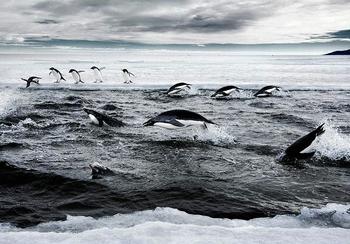
HOBART, Australia, November 4, 2013 (ENS) – A meeting of 24 countries and the European Union has failed again to create the world’s largest marine sanctuary in the vulnerable environment of Antarctica’s Southern Ocean.
The week-long meeting that closed Friday was the third attempt since 2012 by the Commission for the Conservation of Antarctic Marine Living Resources, or CCAMLR, to protect large areas in the Southern Ocean.
The two proposals that CCAMLR failed to pass each would have protected a vast expanse inhabited by some 10,000 unique species, including most of the world’s penguins, whales, seabirds, giant squid and the Antarctic toothfish, which is the main target of fishing companies in the region.

A U.S. and New Zealand proposal would have established a Ross Sea marine protection area of 1.32 million square kilometers with a 1.25 million km2 area no-take zone, about the size of Alaska.
A proposal from Australia, France and the European Union would have delineated an East Antarctic marine protection area network of 1.6 million km2 in which future fishing activities would have to be approved by international consensus.
Together the two proposals would more than double the protected areas of the world’s oceans.
Russia and Ukraine actively blocked the two proposals, with China withdrawing its support for the East Antarctic proposal.
Russia and Ukraine, which have fishing interests in the region, ran out on the clock filibuster-style after earlier expressing positive attitudes about the proposals.
EU Fisheries Commissioner Maria Damanaki expressed her disappointment with the failure, saying Monday, “The adoption of these Marine Protected Areas would have been a bold and important step for marine protection in CCAMLR and globally. This is another missed opportunity for CCAMLR to fulfil its own objective to establish a network of MPAs.”
“We will continue to support the establishment of these MPAs and hope that CCAMLR can continue to be a leading force in marine conservation,” Damanaki said.
Some claimed that the proposals are not supported by sufficient scientific justifications, but conservationists and some negotiators say they are based on decades of science including the obaservation that currents in Antarctica’s Southern Ocean sustain three-quarters of the Earth’s marine life.

When CCAMLR turned down these proposals in July, U.S. Secretary of State John Kerry said he is committed to the eventual designation of these marine reserves. “This is a longtime passion of mine and it’s an imperative for me as Secretary of State. I’ve seen firsthand how acidification, pollution, and sea level rise tear at the fabric of our economies, our communities, even our security. But this isn’t just a personal priority. The Ross Sea is a natural laboratory. Its ecosystem is as diverse as it is productive, and we have a responsibility to protect it as environmental stewards – just as we do the rest of the ocean.”
The Southern Ocean is a crucial area for scientific research, both for studying how intact marine ecosystems function and for determining the impacts of global climate change, says the U.S.-based nonprofit Pew Charitable Trusts, a long-standing advocate for the reserves.
Joshua Reichert, executive vice president of The Pew Charitable Trusts, said, “There is a global consensus on the need to protect the Antarctic Ocean that is supported by sound science. The overwhelming majority of the member countries of CCAMLR, which is the regional fisheries management organization with jurisdiction over the Antarctic Ocean, support the establishment of a permanent reserve in these waters.”
James Barnes, executive director of the nonprofit Antarctic and Southern Ocean Coalition, told the delegates his organization “cannot quite understand how CCAMLR has arrived at this position.”
“The decision to establish a network of MPAs in the Southern Ocean was made by consensus. Setting a 2012 target for the initial network was made by consensus. CM 91-04 creating the framework for designating MPAs was made by consensus,” he said. “These steps imply that all CCAMLR Members are prepared to carry out the commitments. But the sad reality is that not all Members are prepared to act.”
To add a further somber note to events in Hobart, U.S. citizen Elyssa Rosen, of Reno, Nevada, 48, died in a SCUBA diving accident off the coast of Tasmania. She was in Hobart attending the CCAMLR conference as an employee of the Pew Charitable Trusts.
Rosen’s family issued a statement, saying, “Elyssa was a committed steward of all things around her – she loved people and the natural world with a great passion and selflessness. We take some comfort knowing her last moments came in a place that reflected her passion and commitment to conservation and protecting natural resources around the world. As we reflect on her life, we are emboldened by her vision and actions to sustain the richness of our world and to celebrate the joy of humanity.”
Copyright Environment News Service (ENS) 2013. All rights reserved.
© 2013, Environment News Service. All rights reserved. Content may be quoted only with proper attribution and a direct link to the original article. Full reproduction is prohibited.
